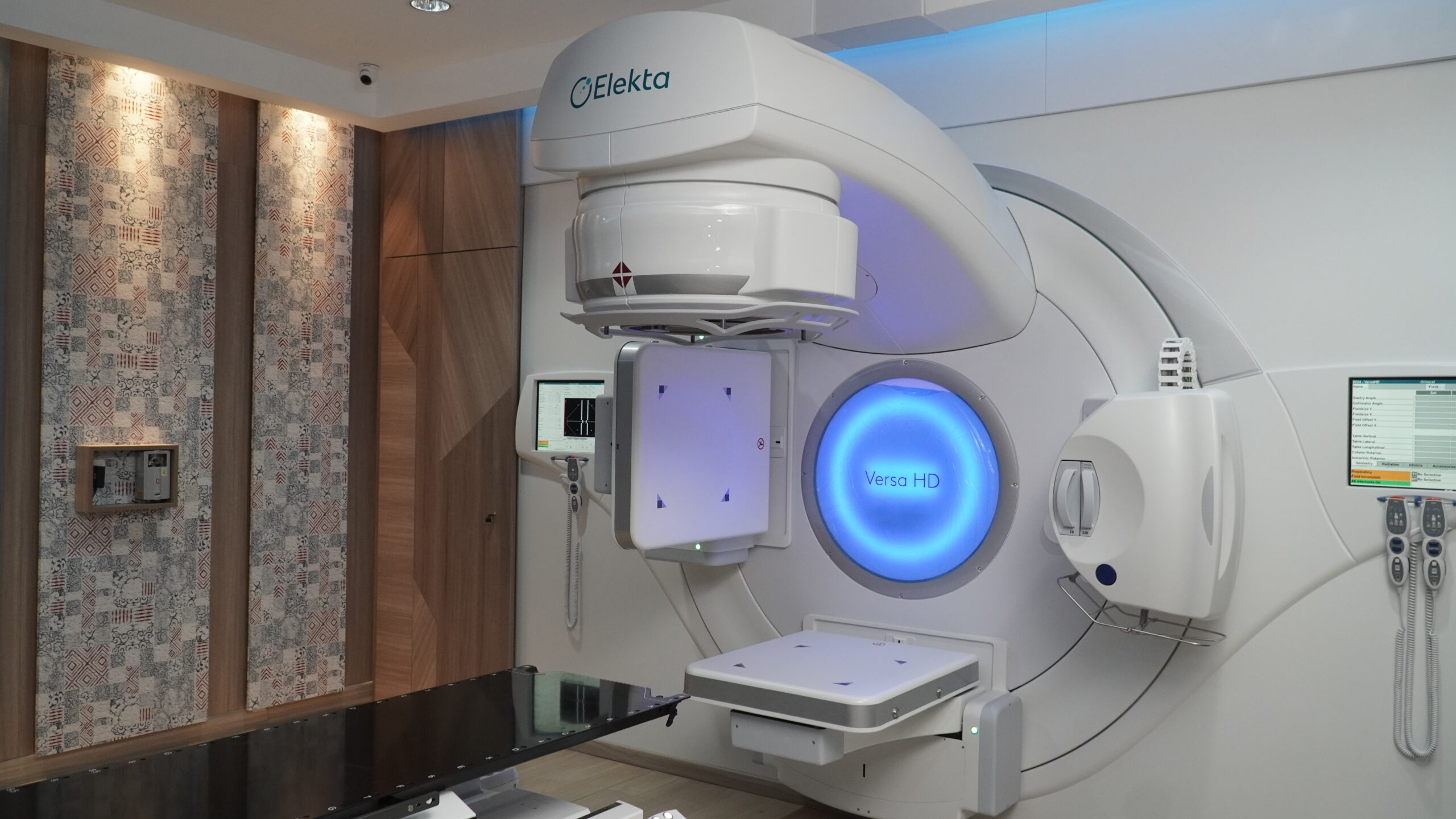Nasopharyngeal cancer is a type of cancer that develops at the back of the nasal cavity, specifically behind the roof of the mouth. This type of cancer is more prevalent in Southeast Asia, including Indonesia. Its causes are multifactorial, ranging from Epstein-Barr virus (EBV) infection and genetic predisposition to environmental factors.
One of the main treatment methods for nasopharyngeal cancer is radiation therapy, which uses radiation energy to destroy cancer cells while preventing their spread to surrounding tissues.
At Mandaya Royal Hospital Puri, radiation therapy for nasopharyngeal cancer is supported by Elekta Versa HD, the latest generation of radiotherapy machines with extremely high precision—up to 1 mm accuracy. This advanced technology allows more effective targeting of tumors while minimizing damage to surrounding healthy tissue.
Contents
Advantages of Elekta Versa HD: Radiotherapy with SRS and SBRT
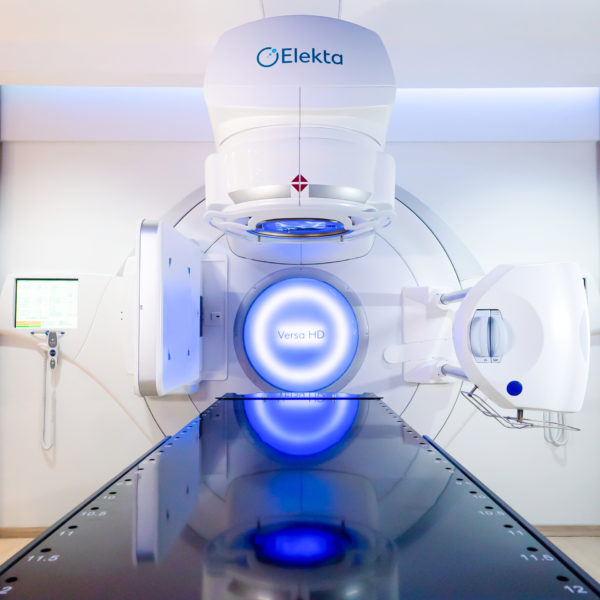
Elekta Versa HD is a state-of-the-art radiotherapy device equipped with SRS (Stereotactic Radiosurgery) and SBRT (Stereotactic Body Radiotherapy) technologies. These enable high-dose radiation delivery with submillimeter accuracy, effectively destroying cancer cells without causing significant damage to healthy tissues nearby.
Another advantage of Elekta Versa HD is its ability to target multiple tumors simultaneously in a single session with high accuracy, making treatment faster, more efficient, and more comfortable for patients.
1. High precision with robotic system
Supported by 4D image-guided radiotherapy (IGRT) integrated with an advanced robotic system, this machine can align radiation beams in real time to the tumor area with submillimeter accuracy. This ensures the optimal delivery of radiation doses directly to cancer cells while protecting healthy tissue.
2. Radiosurgery technology (SRS & SBRT)
With SRS and SBRT, Elekta Versa HD functions like a “radiation scalpel” that destroys cancer cell DNA with precision. Because high doses of radiation can be delivered, fewer therapy sessions are required compared to conventional radiotherapy, without reducing treatment effectiveness.
3. Treating multiple tumors simultaneously
Elekta Versa HD can deliver radiation to multiple tumor sites at once, with a wide coverage of up to 40 cm x 40 cm. This feature is enhanced by Agility technology, which shapes the radiation beams to match the specific size and location of tumors.
Radiation Oncology Specialists at Mandaya Royal Hospital Puri
In addition to advanced technology, Mandaya Royal Hospital Puri is home to a team of experienced radiation oncology specialists who provide comprehensive care for cancer patients, including those with nasopharyngeal cancer.
1. Prof. Dr. Soehartati A. Gondhowiardjo, Sp.Onk.Rad (K)
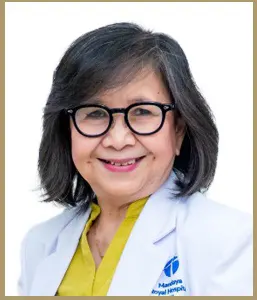
Prof. Soehartati is one of Indonesia’s leading experts in radiation oncology. She completed her medical degree at Universitas Indonesia (1980), followed by specialization in Radiology (1987) and Subspecialization in Radiation Oncology (1989) at Universitas Indonesia and the Strahlentherapie Abteilung Wilhelm-Westfälischen Universität Münster, Germany. In 1998, she earned her Doctor of Medical Sciences degree from Universitas Indonesia in collaboration with AKH Vienna, Austria.
Beyond her academic achievements, Prof. Soehartati has actively contributed to advancing radiation oncology through international courses and workshops, including:
- Indonesia-IAEA Workshop on Radiation Medicine Facilities Development (2023)
- LPDP Scholarship Selection Coaching (2023)
- ESTRO: Evidence-Based Radiation Oncology Course (2023)
Her international experience and dedication to research have played a major role in elevating cancer treatment in Indonesia, especially in improving the quality of technologically advanced radiation therapy.
Prof. Soehartati is available for consultation at Mandaya Royal Hospital Puri on:
- Wednesday: 13:30 – 17:00 WIB
2. dr. Novina Fortunata, Sp.Onk.Rad
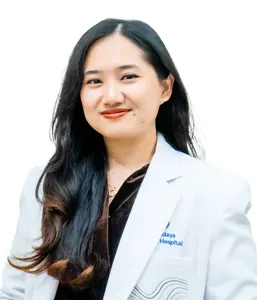
dr. Novina earned her medical degree from Universitas Airlangga before specializing in Radiation Oncology at Universitas Indonesia. She consistently updates her expertise through scientific forums and international training, such as:
- The 3rd Jakarta Annual Collaborative Cancer Meeting (JACCM) 2022
- FARO Webinar (Federation of Asian Organizations for Radiation Oncology)
- Continuing education programs by the Indonesian Radiation Oncology Society (IROS)
Her active participation in scientific forums highlights her commitment to staying updated with the latest clinical applications of modern radiotherapy.
dr. Novina is available for consultation at Mandaya Royal Hospital Puri on:
- Monday–Friday: 08:00 – 16:00 WIB
- Saturday: 08:00 – 13:00 WIB
3. dr. Riyan Apriantoni, Sp.Onk.Rad
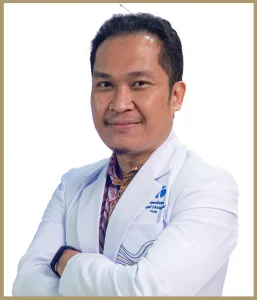
dr. Riyan completed his medical degree at Universitas Sriwijaya and later pursued specialization in Radiation Oncology at Universitas Indonesia. He has expertise in various radiation therapy methods, including:
- SRS & SBRT technology
- Brachytherapy (internal radiation therapy)
- External beam radiation therapy for different types of cancer
With this wide range of skills, dr. Riyan provides patients with tailored treatment options, whether through external or internal radiation methods.
dr. Riyan is available for consultation at Mandaya Royal Hospital Puri on:
- Monday–Friday: 17:00 – 19:30 WIB
Mandaya Cancer Center: Supported by Complete and Modern Technology
Mandaya Royal Hospital Puri features the Mandaya Cancer Center, an integrated cancer treatment facility that combines advanced diagnostic technologies, modern therapies, and an experienced multidisciplinary team. Nasopharyngeal cancer patients receive precise, personalized, and comprehensive care—from early detection to advanced treatment.
Some of the key facilities include:
1. Digital PET CT Scan
A gold standard in cancer detection and monitoring, Digital PET CT combines Positron Emission Tomography (PET) and Computed Tomography (CT) scans. It allows:
- Early detection of nasopharyngeal cancer.
- Identification of cancer spread to lymph nodes or other organs.
- Evaluation of treatment effectiveness, such as radiation therapy or chemotherapy.
- With high-resolution imaging, doctors can design more accurate treatment plans.
2. Genomic Laboratory
Since each cancer type, including nasopharyngeal cancer, has a unique genetic profile, the Genomic Lab at Mandaya analyzes DNA and molecular characteristics of tumors to:
- Detect specific genetic mutations.
- Determine the most suitable therapy based on the tumor’s genetic profile.
- Support personalized medicine for more effective treatment with fewer side effects.
3. Immunotherapy
In addition to radiotherapy, immunotherapy represents a breakthrough in modern cancer treatment. For certain nasopharyngeal cancer patients, immunotherapy can:
- Strengthen the immune system to recognize and destroy cancer cells.
- Deliver longer-lasting results compared to conventional methods.
- Serve as an alternative for patients who do not respond well to chemotherapy or radiotherapy.
4. Nuclear Medicine
Equipped with the latest technology, Mandaya’s Nuclear Medicine department supports both cancer diagnosis and treatment by:
- Using low-dose radioactive tracers to precisely detect even very small cancers.
- Delivering internal targeted radiation therapy to destroy cancer cells from within, while minimizing impact on healthy tissue.
This combination of diagnostics and therapy makes treatment more comprehensive and effective.
To make your visit easier, Mandaya Royal Hospital Puri offers convenient access through WhatsApp Chat, Book Appointment, or the Care Dokter app, available on Google Play and App Store, where patients can check queue numbers and access complete information.

